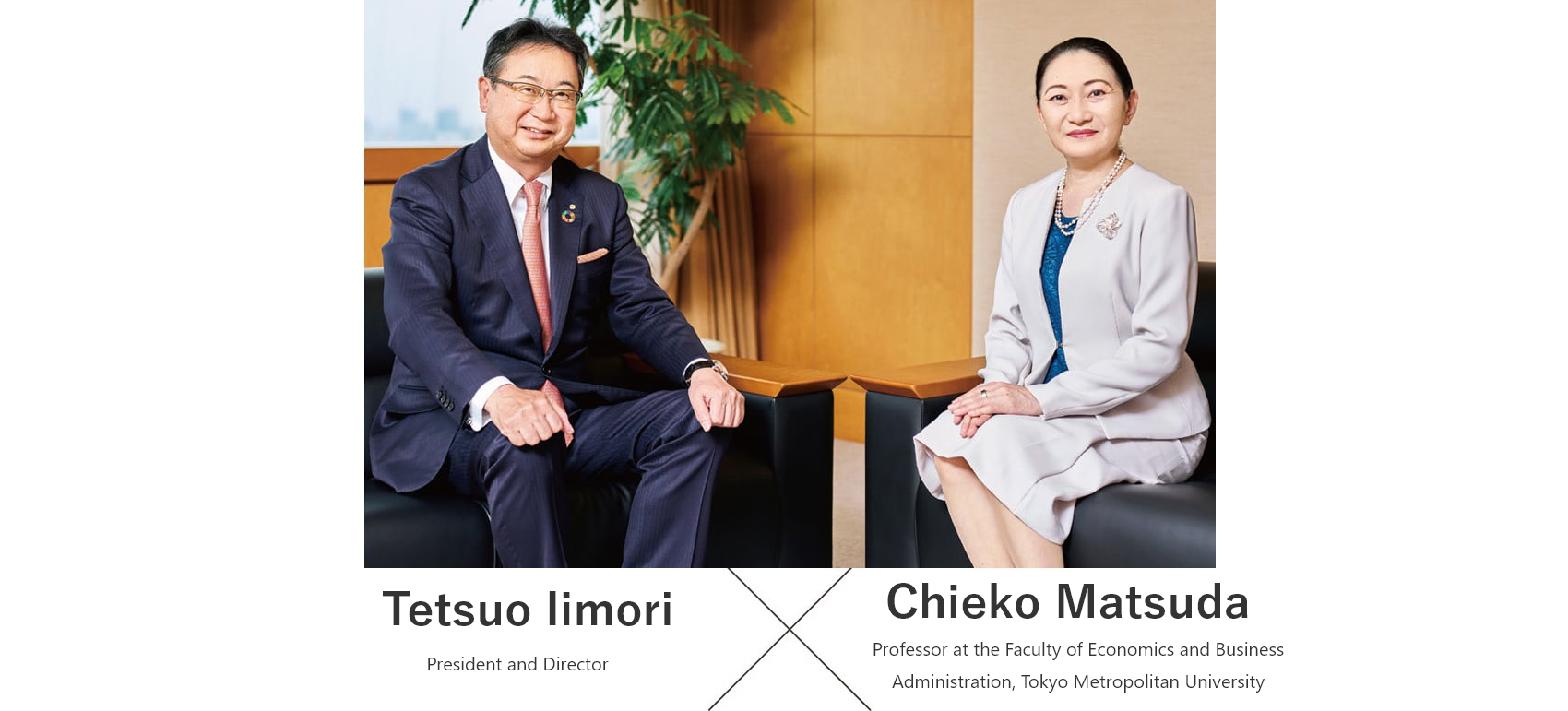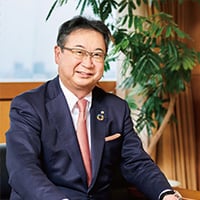Sustainability
President × Expert: Dialogue
What Orico can do now for Society in 2030
With "Orico's 2030 Vision" in mind, we have identified our material sustainability issues and formulated the midium-term management plan through backcasting from 2030.
*Contents of the dialogue at the time of September 2023.

We aspire to stand by our customers to help achieve their dreams
Iimori Orico aims to be a company that values relationships of trust and contributes to society by enabling customers to realize lifestyles of abundance. Based on this fundamental principle, we have set "Standing by Your Side, Helping Dreams Come True" as our brand slogan to permeate this philosophy both internally and externally.
In Japan, especially since the period of rapid economic growth, "money" has been seen as a crucial tool for achieving anything. As a result, our brand slogan embodies our desire to stand by our customers and provide financial support. Today, however, the means of achieving goals have diversified and we recognise that our company is expected to add value beyond the provision of funds. In light of these changes, it is essential for us to create long-term social value in order to enhance our corporate value. We have thus decided to place sustainability at the very heart of our management.
Matsuda Today, we have come to value people more than money. We care about what individuals want to do or how they cherish their relationships. In such times, I believe that "standing by your side, helping dreams come true." is a perfect brand slogan as it conveys the message that not only money but also people are valued. Moreover, since trust and credibility will be the key to business in the future, I believe that the company's fundamental principle of "valuing trusting relationships" will resonate with many people.
Over the past three years, employees have gained a better understanding of sustainability
Iimori In our previous medium-term management plan (FY 2019-FY 2021), we set "strengthening sustainability initiatives" as one of our fundamental strategies. As a first step, we started by learning and contemplating what "sustainability" means and how it relates to our work. Subsequently, we have gradually fostered and shared sustainability awareness through training and other means. I feel that the company has a growing understanding that sustainability is an important theme in our corporate activities.
Matsuda When it comes to sustainability, many companies raise slogans such as "caring for the Earth" or "being environmentally friendly". However, pursuing sustainability for the planet is not the only aspect of corporate sustainability. As Orico has been working on, unless each employee perceives it as their own responsibility, any sustainability slogan would end up meaningless.
Iimori There has long been a debate about corporate social responsibility. Some believe that companies fulfill their responsibility by making profits and paying more taxes, while others believe that they fulfill their responsibility by contributing to the environment and society. Personally, I believe that the true essence of sustainability is to earn a fair profit while contributing to solving environmental and social issues through business.
Matsuda I think it is wonderful that you have examined the concept of sustainability as a precondition for promoting sustainability management, and have incorporated it into the pillars of the company, from corporate philosophy to management strategy.
In times of rapid change, having a strong core vision is essential
Matsuda In the past, when the business environment was stable, so-called "operational excellence" largely determined a company's value. However, in the present era of rapid environmental changes, "management professionals" create value. Corporate leadership significantly influences corporate value, and a company cannot survive unless top management clearly defines what it will base its business decisions on.
Iimori Even in the brief period since April 2020, when I took charge as the President, the social and economic environment has changed rapidly, with the continued spread of coronavirus infections and, more recently, the Ukraine crisis. However, if we respond to every rapid change one by one, we risk losing sight of our fundamental principles and purpose, and we cannot expect future growth if we continuously take a patchwork approach. Therefore, we established "Orico's 2030 Vision" by considering how society will change by 2030 and what role we should play within that context.
Matsuda In times like these, wasn't it difficult to predict the environmental changes in the next ten years?
Iimori I think it is difficult to predict what will happen in six months or a year, but I believe that we can predict, to some extent, what will happen ten years from now. For example, Japan's working-age population is expected to decline to about 69 million by 2030, and we can roughly anticipate trends such as regulations on financial services. In such contexts, we considered how Orico could grow and concluded that we should prioritize "sustainability" - that is, creating both social value and increasing corporate value. Based on these considerations, we have clarified Orico's 2030 Vision, identified the key issues (materiality) that we should address now by backcasting from this vision, and incorporated specific strategies into our new medium-term management plan.
Matsuda Orico's 2030 Vision, the medium-term management plan, and the core philosophy will serve as the very foundation on which the company is built. Whether this foundation is solid or not will greatly affect the possibility of sustainable growth in the future and will impact earning trust from our stakeholders. Today, where we consider our employees as stakeholders, the existence of a solid foundation will also lead to our employees feeling safe.
I would like to ask one more question: As a part of your new "vision", you have set forth several aspects, such as "an innovative, leading company that contributes to resolving various social issues" and "a company that is more than ever recognised by its stakeholders for its significance in society". What were your thoughts behind these aspects?"
Iimori To achieve growth while keeping a firm grasp on customer needs, a market-in approach is important. To achieve this, the use of digital technology is indispensable. Therefore, under the new medium-term management plan, we aim to create an innovative corporate culture through initiatives such as fostering DX talents and cultivating a DX culture. Additionally, I have always aspired to make Orico a company where everyone believes we are a "good company". Some may think that being considered a "good company" does not translate into profits. However, ultimately, only the "good companies" that are desired by the society will survive, and profitability is necessary for survival. Therefore, we hope to grow into a company that is recognized for its raison d'etre by providing value to society while increasing profitability. To achieve this, we begin by becoming an "innovative and leading company" and eventually aim to become a "company that is more than ever recognized for its significance in society."
Regarding the two desired goals, it could be easily understood if we organize them as follows: the starting point is to aim for an "innovative and leading company," and the ultimate goal is to become a "company recognized for its significance to society".
Transforming the company into one that engages and inspires young people
Iimori Many Japanese companies face the challenge of having a high turnover rate among young people, and our company is no exception. Of course, the way people generally think about changing jobs has changed, but I feel that some young employees in Orico may think that they will never find what they want to do if they continue working here. I would like to largely change this trend by creating new systems and fostering a new corporate culture.
Matsuda As I communicate with many students and young people at universities and other institutions on a daily basis, I find that the early turnover of young talent is influenced by whether or not the company focuses on creating an attractive environment for its employees. As we say "you should not try to change people", companies that unilaterally force their employees to change are disliked by young employees. I believe that today's young talent prefers a company which constantly strives to offer an attractive place to work and offers its employees abundant opportunities for growth that exist within the company.
Iimori Yes, I believe that the kind of relationship that you described is a true win-win relationship, and I strongly believe that we should focus on creating an environment where people who want to learn can learn. Furthermore, I would like to keep in mind our fundamental principle of "trust" and pursue management that is trusted and respected by our employees.
Accelerating the creation of social value through business
Iimori We identified six material sustainability issues in order to realize our 2030 vision. In identifying these materialities, we considered what we must prioritize to solve social issues through our business. Based on these materialities, we formulated four business strategies for our medium-term management plan: "Focusing on Key Markets and Exploring New Businesses", "Establishing a Market-In Sales Approach", "Creating New Products and Services through Collaboration with Different Industries and Cutting-Edge Companies", and "Exploring Process Innovation".
Matsuda Companies that focus on materialities that are not directly related to their business lack the understanding of materiality itself. The financial industry is particularly exposed to major environmental changes, and companies cannot expect sustainable growth if they continue to do the same things as in the past. Orico's material issues are closely related to its business and they clearly cover important considerations for the future. In particular, placing "contributing to realizing a safe, secure, and convenient cashless society" as the primary materiality is extremely important and will greatly accelerate sustainable management.
Iimori Thank you very much. To give a specific example, I believe that our settlement and guarantee business can improve the productivity of small and medium-sized enterprises (SMEs). The productivity of SMEs in Japan has long been an issue, and it is believed to be caused by long working hours due to labor shortages. Therefore, we have started to streamline processes such as improving accounts receivable collection efficiency for SMEs, while considering collaborating with different industries. In our overseas business, we intend to contribute to the development of a healthy automobile market in Asia by promoting the creation of a certified used car system with performance guarantees and the development of auto loan applications in Southeast Asia. These initiatives align with the materiality of "contributing to the realization of sustainable communities".
Furthermore, as part of our contribution to achieving a decarbonized and circular society, we aim to promote the transition to a decarbonized society and the realization of a circular energy society through our activities in the international standardization consortium "Mobility Open Blockchain Initiative" (MOBI), which we joined in May 2022 to drive blockchain technology in the next-generation mobility industry.
In addition, we will work on "creating new customer experience value through the utilization of financial expertise", such as supporting the launch of new businesses by startup companies through the provision of our safe and secure payment services.
Matsuda Hearing what President Iimori just mentioned, I once again thought that your company is in a favorable position in the current era. There are few companies with so much financial know-how and big data associated with products and services, as well as the potential to utilize them to achieve both societal value and corporate value. In new businesses, trust and reliability are important, and I expect that Orico will leverage the trust it has gained so far and continue to provide new value to society.
Chieko Matsuda, Professor at the Faculty of Economics and Business Administration, Tokyo Metropolitan University.
After working as a credit analyst at Nippon Credit Bank and Moody's Japan, Ms. Matsuda served as a partner at Corporate Directions and Booz & Company. She became a professor at Tokyo Metropolitan University in 2011, and since then she has leveraged her extensive experience in corporate management and the capital market to conduct research, education, and practical work in areas such as strategic management, financial strategy, group management, and corporate governance.
Sustainability
-
President × Expert: Dialogue

- President × Expert: Dialogue
- This page features a dialogue between the President and the expert on sustainability management.
-
Sustainability Management

- Sustainability Management
- In this page, we introduce our sustainability management, the sustainability basic policy, materiality and other information.
-
Value Creation Process

- Value Creation Process
- This page introduces our Value Creation Process.
-
ESG Information

- ESG Information
- This page is a directory of our Environmental, Social and Governance (ESG) information. This page provides intuitive navigation to the information you are looking for on our sustainability management initiatives.
-
Social contribution activities

- Social contribution activities
- Here, we introduce our approach to social contribution and the results of our activities.
-
ESG Data

- ESG Data
- This page provides a range of ESG data on our sustainability management performance.
-
External Recognition

- External Recognition
- This page presents an external evaluation on our sustainability management initiatives.
